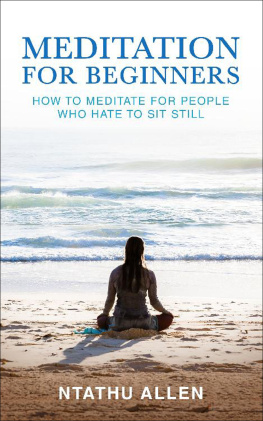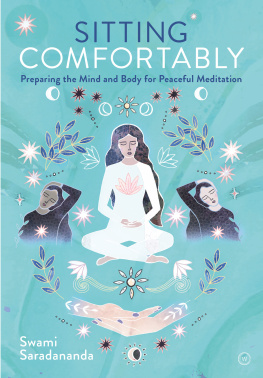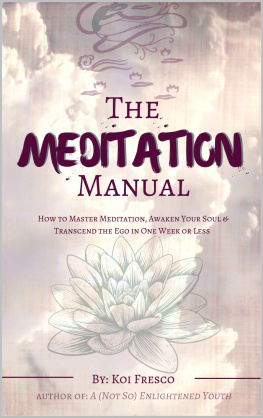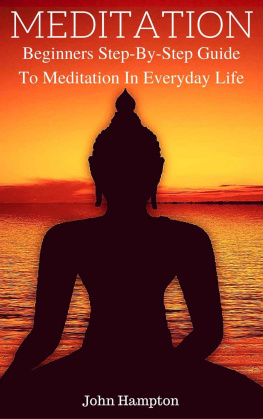I want to thank you and congratulate you for downloading the book, Zen: How to Live Your Life the Zen Way Beginners guide for Zen Meditation.
This book contains actionable information on how to live the Zen way.
Peace and happiness is what all of us desire from deep within, and the good news is that you can make your life completely blissful and peaceful. The perfect way to do that is by following Zen, which is a popular branch of Buddhism.
By following Zen and Zen meditation, you can easily infuse everything happy and positive into your life because Zen helps you cleanse your mind and body of negativities and all the elements that produce negativity. If this intrigues you and youre interested in finding out more about Zen, this guide will serve as your ultimate aide.
This book looks closely into what Zen is, how you can practice it, its benefits along with the challenges you are likely to face while practicing Zen in the start and some wonderful strategies to help you overcome those difficulties. So, get started with it and discover the amazing power of Zen.
Copyright 2016 by Elias Axmar - All rights reserved.
This document is geared towards providing exact and reliable information in regards to the topic and issue covered. The publication is sold with the idea that the publisher is not required to render accounting, officially permitted, or otherwise, qualified services. If advice is necessary, legal or professional, a practiced individual in the profession should be ordered.
- From a Declaration of Principles which was accepted and approved equally by a Committee of the American Bar Association and a Committee of Publishers and Associations.
In no way is it legal to reproduce, duplicate, or transmit any part of this document in either electronic means or in printed format. Recording of this publication is strictly prohibited and any storage of this document is not allowed unless with written permission from the publisher. All rights reserved.
The information provided herein is stated to be truthful and consistent, in that any liability, in terms of inattention or otherwise, by any usage or abuse of any policies, processes, or directions contained within is the solitary and utter responsibility of the recipient reader. Under no circumstances will any legal responsibility or blame be held against the publisher for any reparation, damages, or monetary loss due to the information herein, either directly or indirectly.
Respective authors own all copyrights not held by the publisher.
The information herein is offered for informational purposes solely, and is universal as so. The presentation of the information is without contract or any type of guarantee assurance.
The trademarks that are used are without any consent, and the publication of the trademark is without permission or backing by the trademark owner. All trademarks and brands within this book are for clarifying purposes only and are the owned by the owners themselves, not affiliated with this document.
Table of Contents
Chapter 1: Understanding Zen And Zen Meditation
Zen is a division of Buddhism, which is a code of life started by Siddharta Gautama Buddha around 2500 years back. The word Zen originated from the Chinese word Dhyana, which is usually pronounced as Chaan. The word means meditation. Translated to Japanese, Chan means Zen so Zen simply means seated meditation. The word also means Seon in Korea, Thien in Vietnam and Zen in Japanese.
It is based on the principles and teachings taught by Buddha and emphasizes mainly on meditating regularly and discovering the basic purpose and truth of life. Bodhidharma defined Zen using the following terms:

So what exactly is Zen Buddhism? Well, Zen Buddhism is a blend of Mahayana Buddhism and Taoism Buddhism, a practice, which was handed down from master to disciple across different generations. The truth is that Zen Buddhism is not a theory, belief, fragment of knowledge or ideology so trying to define it is truly fruitless.
However, you can still describe it as a practical experience that entails using Zazen (refers to sitting meditation- it comes from two terms Za, which means sit and Zen, which means meditation). This means that by adopting the Zen way of life, you will have to resort to meditating regularly to find what life truly means and end all your worries, discomforts and tensions.
Teachings of Zen
The essence of Zen lies in living in today, the present moment and letting go of all your concerns pertinent to your future and regrets, worries and bad memories of the past. It helps you experience the present and every moment it brings with itself. According to Buddha, the basic reason why people are unhappy is because they are forgetful of what they are blessed with and are lost in the materialistic world because of their uncontrollable and incessant desires.
When we become lost in this world, we are either worried about what might happen to us, or what we might lose in the future if we dont act in a certain way right now; or we are disturbed by our past- something that has already happened and cannot be changed. We continue ruminating on these thoughts and begin locking them inside our minds. This leads to having a negative and unhealthy mindset, which makes us do all that which isnt healthy and beneficial for us. We backbite, indulge in gossiping, think negatively of others, adopt unhealthy and illegitimate means of earning, become involved in bad habits and do everything that has a bad influence on us. Though we feel we are happy the way we are living, but in reality, we are completely dissatisfied with our lives. We stay depressed quite often and become so involved in negative actions, behaviors, and thinking that we find it difficult to let go. This increases our stress, anxiousness and tension and makes us go through different sorts of sufferings.
Our suffering is exactly what makes life miserable and this is precisely where Zen comes in handy. It teaches us to slowly disengage ourselves from everything that makes us unaware of our beautiful present and avoid it, so we can acknowledge our blessings and be thankful for them. The best way to be mindful of the present and acknowledge it is by improving your concentration and focus, which can be attained by the amazing practice of meditation. This is precisely why Zen revolves around meditation.
Digging Deeper Into Zen
To better understand the purpose of practicing Zen, it is important that you get some knowledge of the fundamentals Zen is based on. Zazen has its roots in Buddhism, which has its basis in the Four Noble Truths and the Eightfold Path. Let us find out what these are.
The Four Noble Truths
As you already know, Buddha developed Buddhism. Buddhas original name was Sidharta Gautama and he was born in a noble family as a prince. Although he lived a life enriched with luxuries, he was never satisfied by it. He always found people going through some sort of suffering which greatly upset him and he decided to abandon his lavish life and go in search of the true meaning of life. His search was quite a long one, but eventually enabled him understand that life revolves around four noble truths.
Truth of Dukha
The first truth aka the truth of dukkha states that each one of us faces some kind of suffering in our lives. Suffering is broadly characterized into mental suffering and physical suffering. Mental or emotional grief refers to the emotional pain we go through upon losing anything important to us, or going through a traumatic episode. Physical suffering points to all the physical pain and misery we go through. From the time we are born until we die, we go through various kinds of physical pain.










